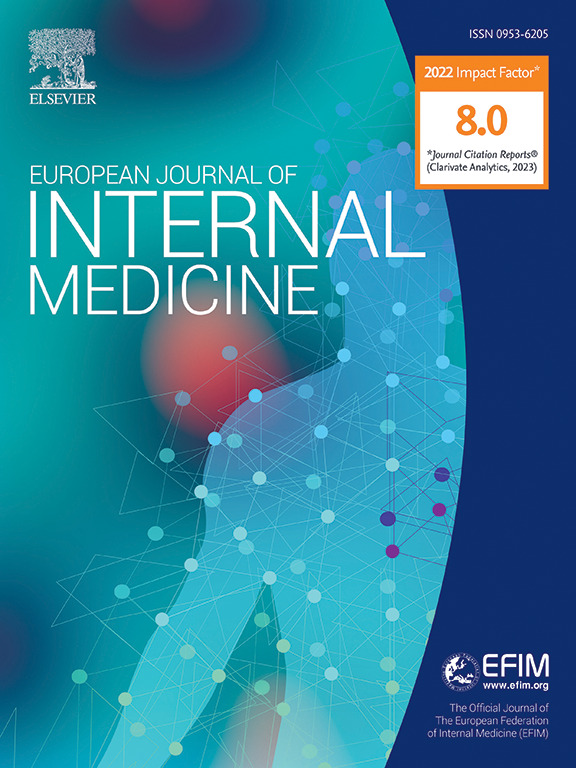Exploring Cardiovascular Risk Factors and Atherosclerosis in Rheumatoid Arthritis
IF 5.9
2区 医学
Q1 MEDICINE, GENERAL & INTERNAL
引用次数: 0
Abstract
Rheumatoid arthritis (RA) is a chronic inflammatory disease mainly affecting the peripheral diarthrodial joints symmetrically and also presenting many extra-articular manifestations. Morbidity and mortality in RA patients are higher compared to the general population. Cardiovascular (CV) disease is one of the most common causes of death in these patients. Classical or traditional risk factors for atherosclerosis development occur more frequently in RA patients compared to those without this condition. Studies have showed that RA patients often present comorbidities such as hypertension, dyslipidemia, diabetes mellitus and obesity. However, the high incidence of CV events occurring in RA patients is not explained by the presence of traditional risk factors. Systemic inflammation, as it is expressed with the presence of proinflammatory cytokines and increased acute phase reactants, may contribute to the development of premature atherosclerosis in these patients. In this review, we explore the risk factors for CV disease, the generation of dyslipidemia, the lipid paradox and the role of systemic inflammation in the atherosclerotic process in RA. We discuss also the role of early therapeutic intervention that suppresses inflammation which may have beneficial effects on CV disease in RA patients.
探索类风湿关节炎的心血管风险因素和动脉粥样硬化。
类风湿性关节炎(RA)是一种慢性炎症性疾病,主要累及对称性外周二关节,也有许多关节外表现。与普通人群相比,RA 患者的发病率和死亡率较高。心血管疾病是这些患者最常见的死因之一。与无动脉粥样硬化的患者相比,RA 患者更容易出现动脉粥样硬化的经典或传统风险因素。研究表明,RA 患者通常伴有高血压、血脂异常、糖尿病和肥胖等合并症。然而,传统风险因素的存在并不能解释 RA 患者心血管事件高发的原因。全身炎症表现为促炎细胞因子的存在和急性期反应物的增加,这可能会导致这些患者过早发生动脉粥样硬化。在这篇综述中,我们探讨了心血管疾病的危险因素、血脂异常的产生、血脂悖论以及全身炎症在 RA 动脉粥样硬化过程中的作用。我们还讨论了抑制炎症的早期治疗干预的作用,这可能会对 RA 患者的心血管疾病产生有益的影响。
本文章由计算机程序翻译,如有差异,请以英文原文为准。
求助全文
约1分钟内获得全文
求助全文
来源期刊
CiteScore
9.60
自引率
6.20%
发文量
364
审稿时长
20 days
期刊介绍:
The European Journal of Internal Medicine serves as the official journal of the European Federation of Internal Medicine and is the primary scientific reference for European academic and non-academic internists. It is dedicated to advancing science and practice in internal medicine across Europe. The journal publishes original articles, editorials, reviews, internal medicine flashcards, and other relevant information in the field. Both translational medicine and clinical studies are emphasized. EJIM aspires to be a leading platform for excellent clinical studies, with a focus on enhancing the quality of healthcare in European hospitals.

 求助内容:
求助内容: 应助结果提醒方式:
应助结果提醒方式:


